1. Purpose of the White Paper
The goal of this white paper is to introduce and explain the implementation of a blockchain-based solution for the Kobe beef industry and how it can help not only the environment but also introduce this very specific industry into the future. This solution aims to address critical issues related to transparency, authenticity, sustainability, and consumer trust in premium quality meat.
Readers can expect to learn about the current challenges facing the meat market, especially the premium beef market (focusing on the Kobe beef especially) , the proposed blockchain solution's technical details, its benefits for consumers and farmers, and the broader impact on the industry and how .
Additionally, the white paper will cover the implementation plan, tokenomics, regulatory considerations, and potential use cases across various industries.
2. Problem Statement
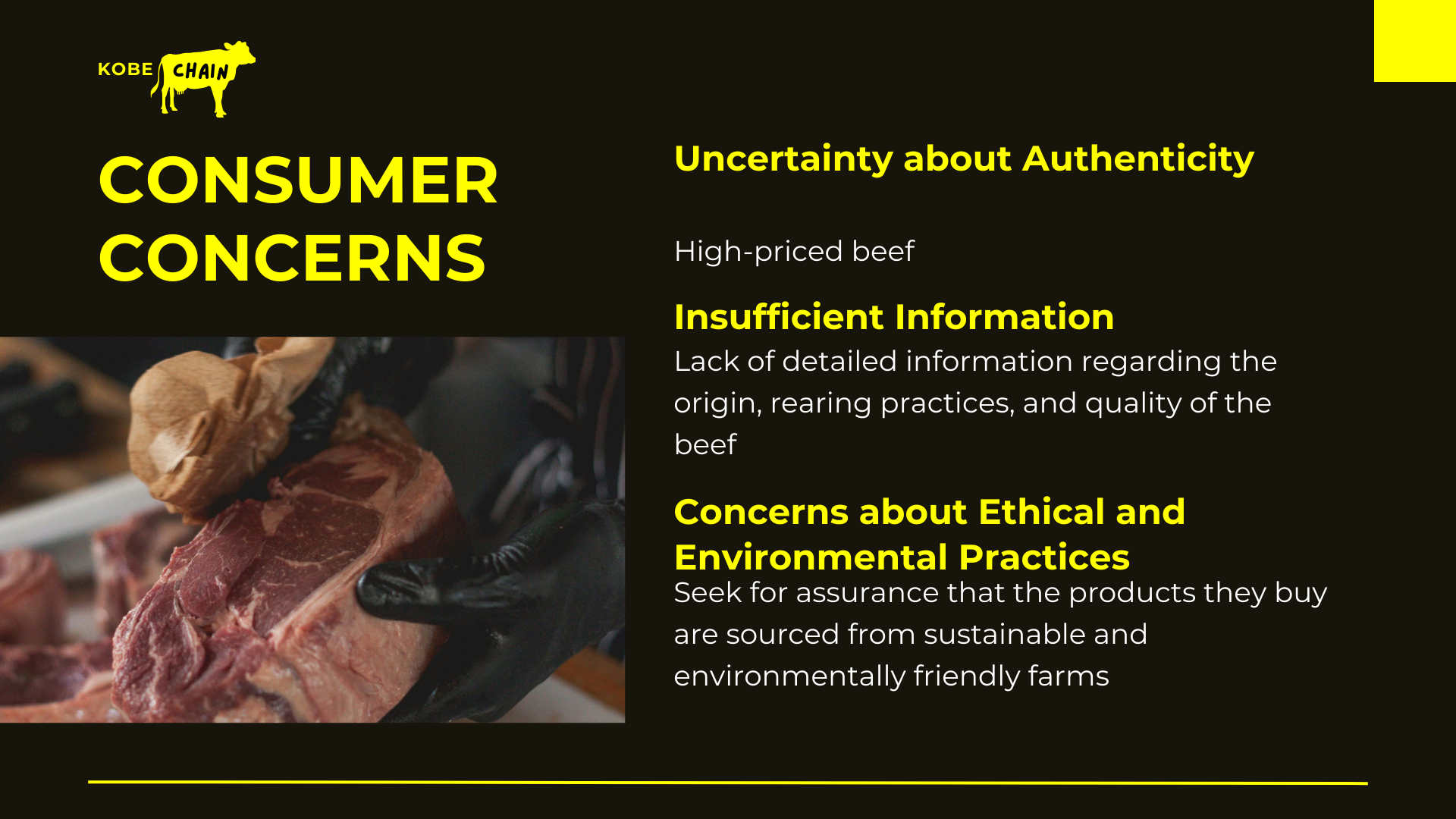
Consumer Concerns
Lack of Transparency and Trust in Premium Quality Meat:
-
Uncertainty about Authenticity: Consumers are often unsure if the high-priced Kobe beef they purchase is genuinely authentic and meets the premium quality standards it promises.
-
Insufficient Information on Origin and Quality: There is a lack of detailed information regarding the origin, rearing practices, and quality of the beef. This information gap makes it difficult for consumers to make informed purchasing decisions.
-
Concerns about Ethical and Environmental Practices: Increasingly, consumers are concerned about the ethical and environmental impact of their food. They seek assurance that the products they buy are sourced from sustainable and environmentally friendly farms.
Farmer Challenges
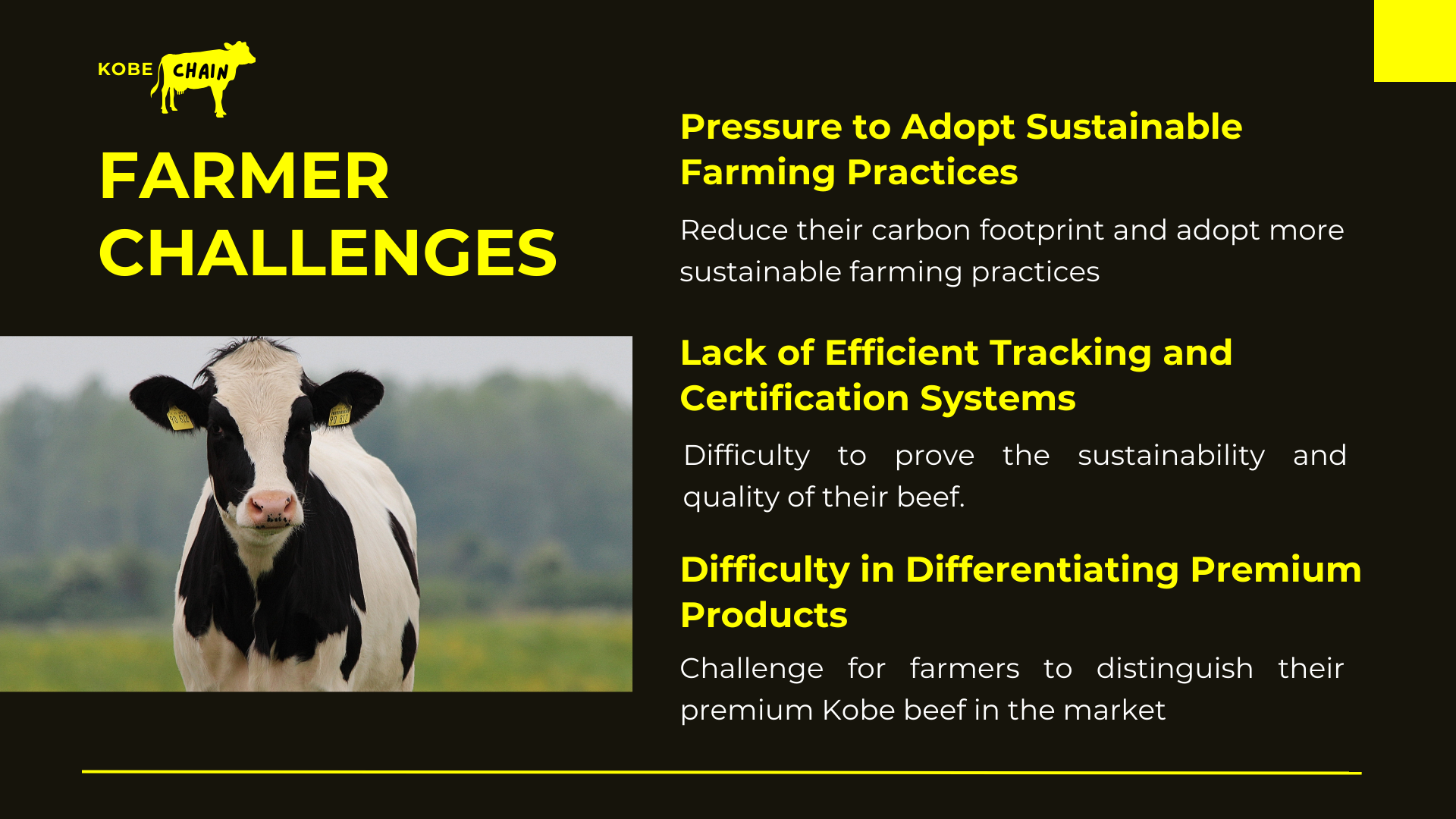
Need for a Carbon-Clean Environment and Sustainable Practices:
-
Pressure to Adopt Sustainable Farming Practices: Farmers are under growing pressure to reduce their carbon footprint and adopt more sustainable farming practices to meet regulatory standards and consumer expectations.
-
Lack of Efficient Tracking and Certification Systems: Farmers often struggle with the lack of efficient systems to certify and track their products, making it difficult to prove the sustainability and quality of their beef.
-
Difficulty in Differentiating Premium Products: Without a robust certification system, it is challenging for farmers to distinguish their premium Kobe beef in the market, potentially leading to lower profits despite high-quality products.
The overall industry faces significant challenges due to the lack of transparency and reliable certification for Kobe Japanese beef. This mistrust erodes consumer confidence, leading to a general skepticism towards premium beef products. Without a clear way to verify authenticity and quality, consumers may turn to alternative meats, stifling market growth and diminishing the demand for Kobe beef. Additionally, incidents of fraud and misrepresentation can severely damage the industry's reputation, further reducing consumer interest and potentially harming all producers and sellers within the sector.
Moreover, the inability to effectively track and certify sustainable practices inhibits the industry's ability to appeal to eco-conscious consumers. This growing market segment demands transparency and ethical sourcing, and without meeting these expectations, the industry risks losing these customers. Consequently, the premium beef market may face stagnation and limited expansion potential, especially in international markets where stringent standards are essential. Addressing these issues with a robust blockchain and NFT-based system is crucial for restoring consumer trust, promoting sustainability, and driving overall market growth.
3. Solution
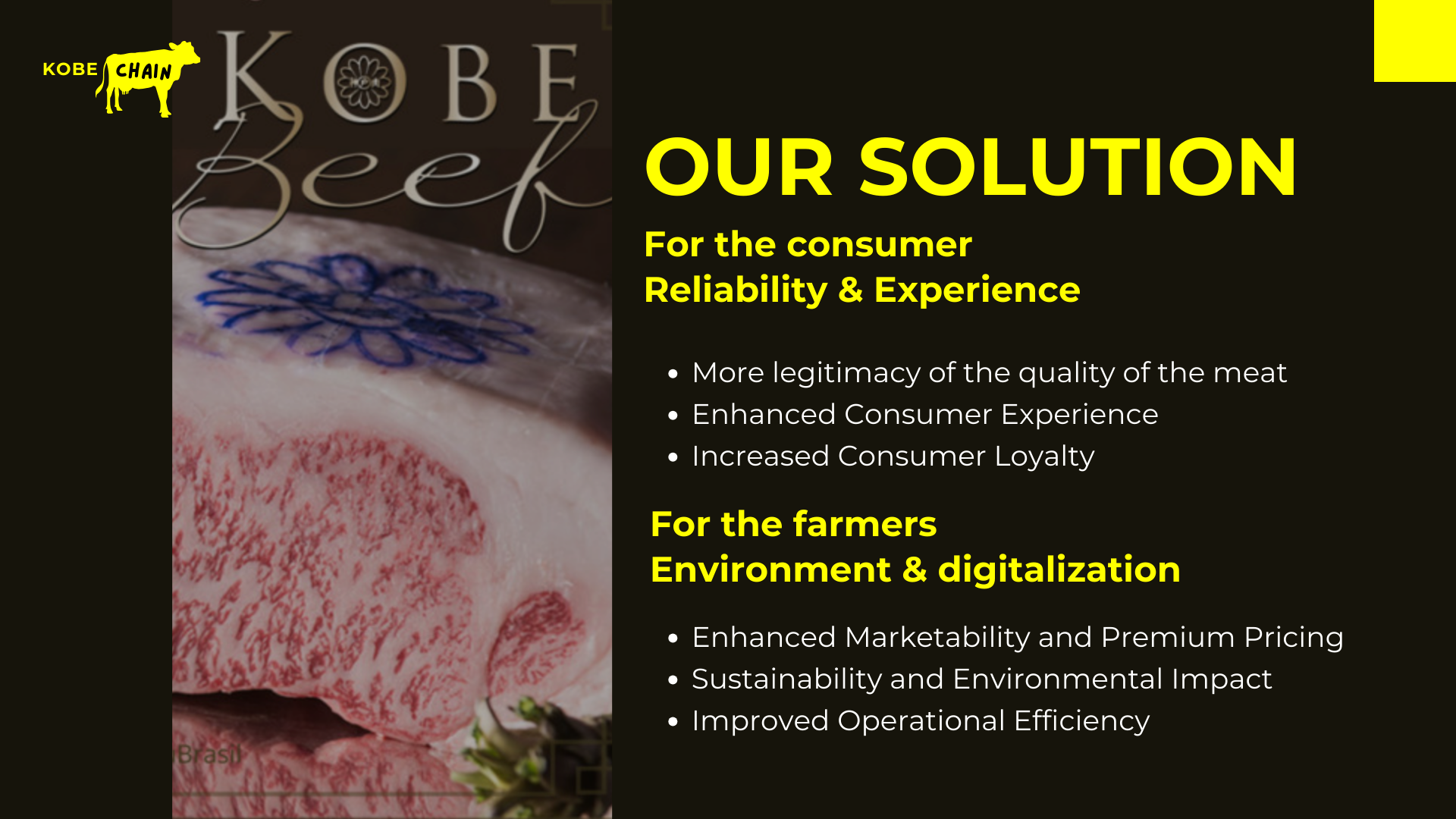
3.1 Overview of the solution
Having in consideration the high expectations of the consumers of this expensive beef, it requires an equally high reliability system to assure not only the legitimacy of the meat, but also to preserve some more information about the conditions that were present when this animal was killed. (ex: temperature, age, breed, weight, gender, size, body part, etc
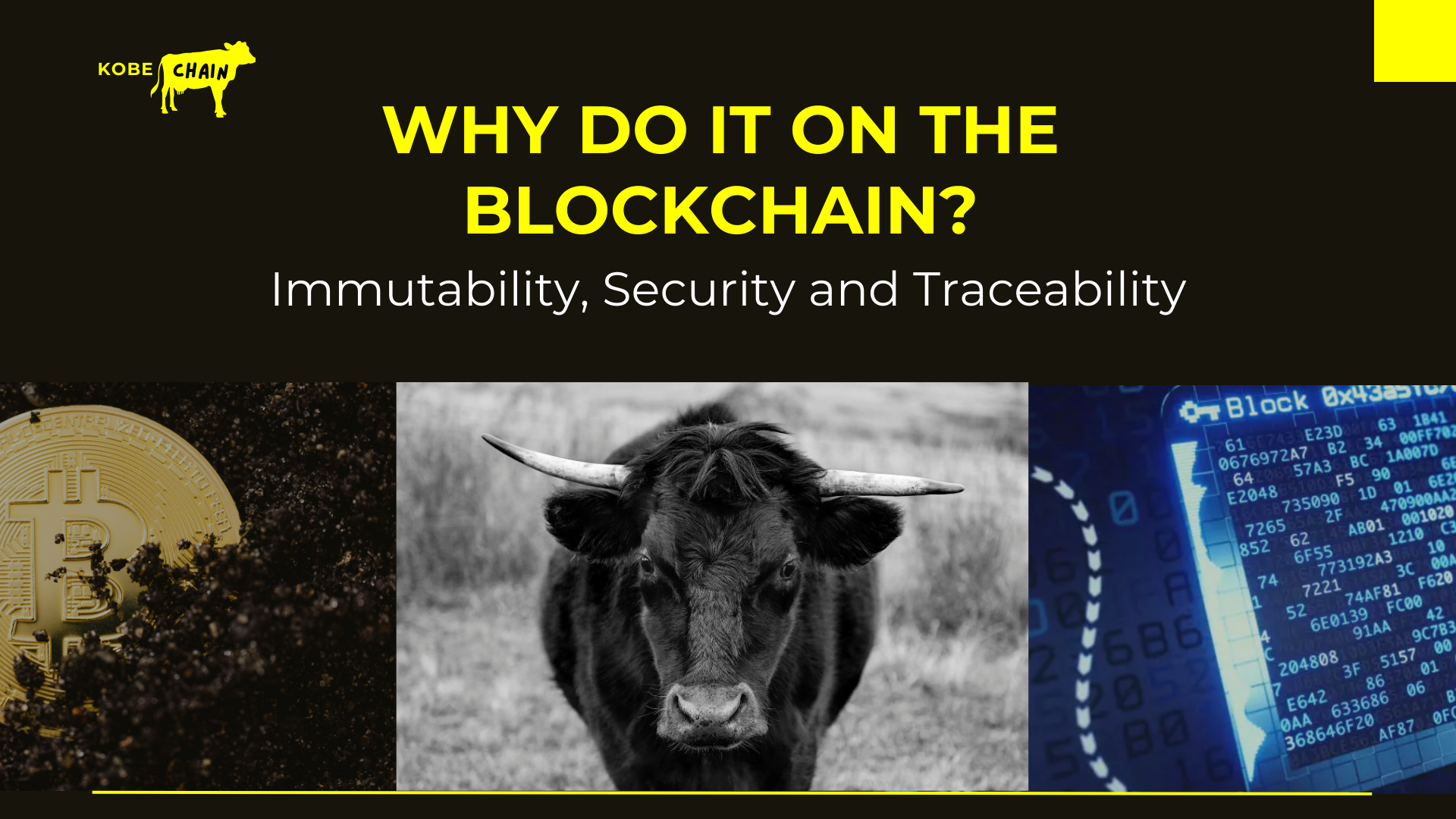
Taking in consideration the specificities of the blockchain, it creates the perfect environment to accommodate this type of information, due to its characteristics such as:
Immutability: Once data is recorded on the blockchain, it cannot be altered or deleted, ensuring data integrity, this one of the most important features, due to the sensitivity of the users about the meat, this feature will assure piece of mind that the type of cow doest change with time
Security: Cryptographic techniques are used to secure data, making it resistant to hacking and fraud, which will enhance the reliability of the system
Traceability: Every transaction can be traced back to its origin, which is useful for auditing and verification purposes, that once again it will give more security to the buyers that the meat is indeed authentic
Due to all the facts presented before it justifies that the use of blockchain is certainly the best way to store information and it will increase the value of our certifications. On the other side, since all the meat producers worldwide have the need to mitigate their CO2 emissions in this industry, why not try to exploit this problem as an advantage ? This project's objective is not purely the digitization of the currently issued “Kobe Beef Certificates”, but also to reduce the carbon footprint of these producers. That carbon footprint not only includes the carbon released by the manufacturing process of the paper, ink and stamps, it also incompasses the pollutants released by raising the cattle such as methane. Compounds like those which are released during digestion of the feed in the gastro-intestinal tract of and are usually released into the atmosphere where they can and do cause concerns in terms of environmental impact and greenhouse effect aggravation. In order to take advantage of these gasses our proposal is using already available and tested technology waste created by these cows to be gathered and used to create the electricity which is going to power the validation of the block in the network.
3.2 Innovations
This project enable a new set of game change features and innovations that gets the meat tracing to a whole nother level likewise:
Comprehensive Data Recording: Integration of IoT devices to continuously monitor and record environmental conditions such as temperature, humidity, and location throughout the supply chain. This will increase the transparency and ensure real-time, accurate data logging, minimizing the risk of data tampering or loss and providing end-to-end visibility of the beef's journey from farm to table.
Consumer Access Portal: A user-friendly mobile and web application that allows consumers to scan a QR code to access detailed information about the meat's origin, breed, age, and processing conditions. Directly connects consumers with the data, enhancing transparency and enabling informed purchasing decisions, thereby increasing consumer confidence and satisfaction.
Dynamic Labeling System: Implementation of dynamic labels that update in real-time to reflect the latest data recorded on the blockchain used by the producers, this would have a huge impact on the reduction of ink and paper used to emit the Kobe Beef certificates. The most important thing is to reduce the carbon footprint of these producers.
Multi-Layered Security Protocols: Incorporation of multi-layered security protocols, including advanced encryption, multi-signature authentication, and regular security audits. Provides robust protection against data breaches and unauthorized access, further ensuring the integrity and security of the information stored on the blockchain.
Turning waste into energy: Take advantage of the waste produced by the cows, and metabolize it into energy to run this chain. It's clear that all the energy required in the blockchain is not going to be from this innovative energy but the goal is to make it as green as possible.
3.2 Impact of the solution
The following list enumerates and elaborates all the benefits of this project, both for the consumers and producers
For Consumer:
-
Increased Trust and Confidence:
-
Authenticity Verification: Consumers can verify the authenticity of Kobe beef through immutable blockchain records, ensuring they receive genuine premium products.
-
Quality Assurance: Detailed information accessible via NFTs, such as rearing practices and quality standards, enhances consumer confidence in the product.
-
-
Enhanced Consumer Experience:
-
Transparency: The ability to trace the entire journey of the beef from farm to table provides consumers with complete transparency, improving their purchasing experience.
-
Informed Decision-Making: Access to comprehensive data allows consumers to make informed choices, aligning with their preferences for quality and ethical sourcing.
-
-
Increased Consumer Loyalty:
-
Trust in Ethical Practices: Knowing that the beef is sourced from sustainable and environmentally responsible farms can increase brand loyalty among eco-conscious consumers.
-
Premium Pricing Justification: Clear evidence of quality and authenticity justifies the premium prices, reducing buyer’s remorse and fostering repeat purchases.
-
For Producers:
-
Enhanced Marketability and Premium Pricing:
-
Differentiation in the Market: Farmers can clearly distinguish their high-quality Kobe beef from lower-quality alternatives, allowing them to command higher prices.
-
Brand Reputation: Establishing a reputation for transparency and sustainability can enhance the farm’s brand, attracting more customers.
-
-
Improved Operational Efficiency:
-
Streamlined Certification: The blockchain system simplifies the certification process, reducing paperwork and administrative burdens.
-
Efficient Tracking: Automated tracking of beef through the supply chain improves operational efficiency and reduces the risk of fraud.
-
-
Sustainability and Environmental Impact:
-
Promotion of Eco-Friendly Practices: Farmers are incentivized to adopt and maintain sustainable practices to meet certification standards, contributing to a cleaner environment.
-
Carbon Footprint Reduction: Accurate tracking and certification of sustainable practices help in monitoring and reducing the farm’s carbon footprint.
-
-
Increased Trust and Relationships:
-
Trust with Consumers: Transparent practices build trust with consumers, potentially leading to direct-to-consumer sales channels and stronger customer relationships.
-
Trust with Partners: Enhanced transparency can also improve trust with supply chain partners, leading to more stable and profitable business relationships.
-
4. Use Cases
Pharmaceuticals
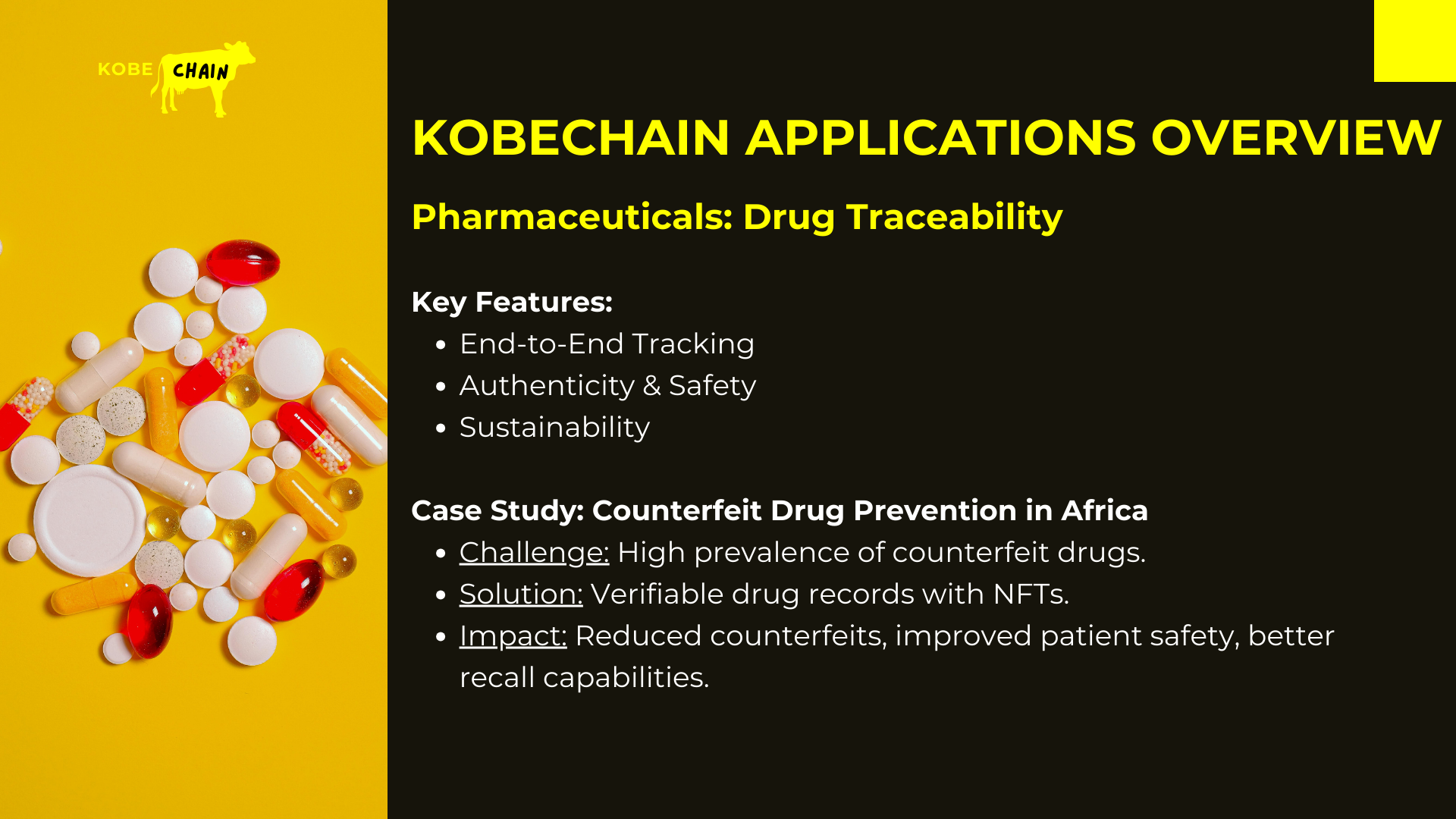
Example: Drug Traceability
Application Details:
-
End-to-End Tracking: KobeChain can be used to trace pharmaceutical products from manufacturing to distribution to the end consumer. Each step in the supply chain, including manufacturing, packaging, and shipping, can be recorded on the blockchain.
-
Authenticity and Safety: Blockchain technology ensures that records are immutable, preventing tampering and ensuring the authenticity of drugs. Consumers and healthcare providers can verify that drugs are genuine and have been stored and handled correctly.
-
Carbon Neutral Certification: By using methane to power the blockchain, pharmaceutical companies can ensure their operations are more sustainable. This is particularly important in an industry under scrutiny for its environmental impact.
Case Study: Counterfeit Drug Prevention in Africa
-
Challenge: High prevalence of counterfeit drugs leading to health risks and financial losses.
-
Solution: Implement KobeChain to provide a verifiable record of drug authenticity. Each pharmaceutical product is assigned an NFT with detailed information about its origin, manufacturing process, and supply chain journey.
-
Impact: Significant reduction in counterfeit drugs entering the market. Improved patient safety and trust in the pharmaceutical supply chain. Enhanced ability to track and recall defective or dangerous products swiftly.
Fashion and Apparel
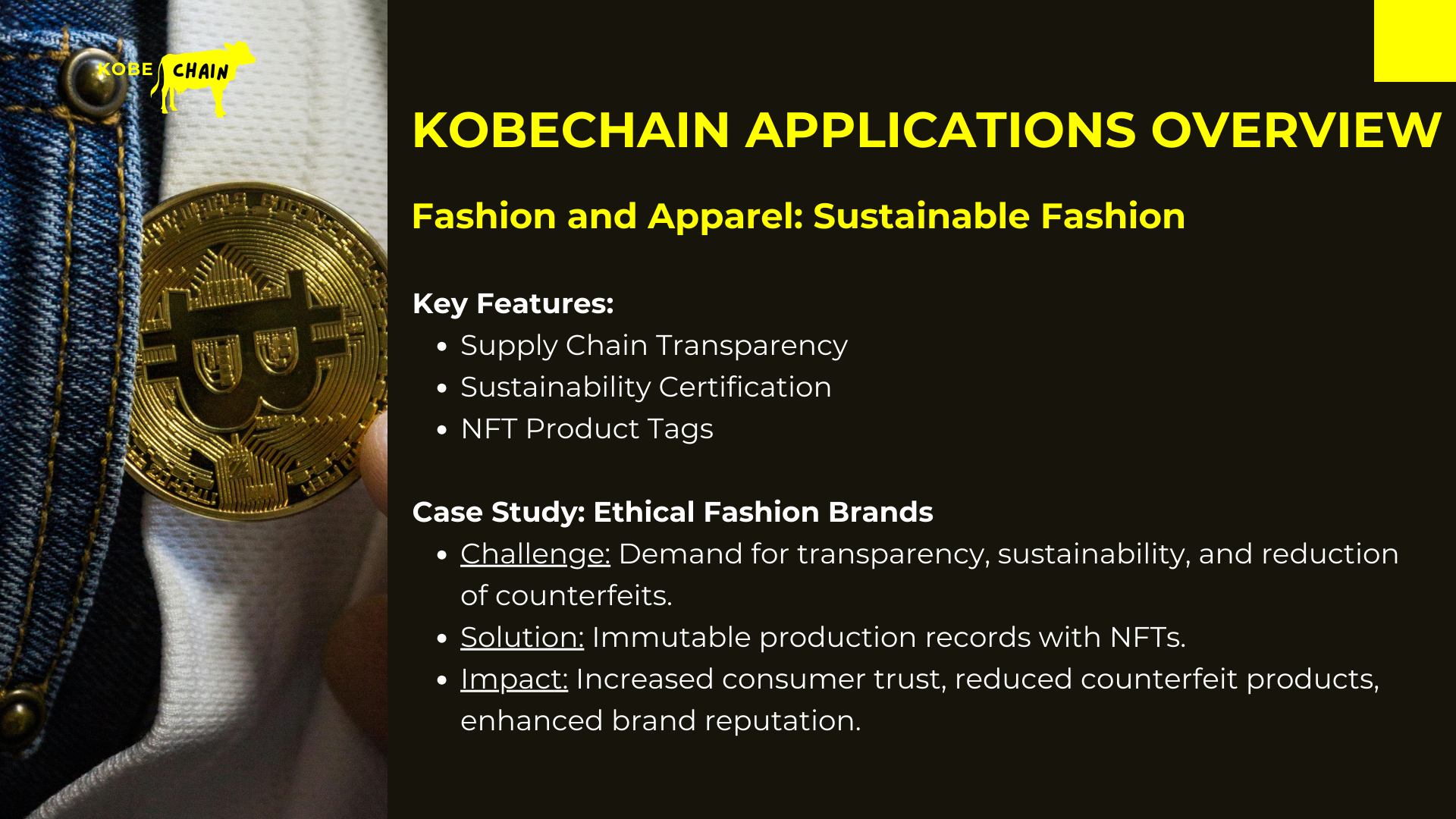
Example: Sustainable Fashion
Application Details:
-
Supply Chain Transparency: KobeChain can document the entire lifecycle of a garment, from raw material sourcing to manufacturing, distribution, and retail. This ensures transparency about the origins and journey of each product.
-
Sustainability Certification: Using methane to power blockchain validation, fashion brands can certify their products as carbon-neutral. This appeals to environmentally conscious consumers looking for sustainable fashion choices.
-
NFT Product Tags: Each garment can be associated with an NFT that includes detailed information about its production, including material sources, labor practices, and environmental impact. Consumers can scan a QR code to access this information.
Case Study: Ethical Fashion Brands
-
Challenge: Growing demand for transparency and sustainability in fashion, combined with issues of counterfeit products and unethical labor practices.
-
Solution: Implement KobeChain to provide detailed, immutable records of each garment's production process. Brands can issue NFTs that verify the ethical and sustainable practices used in creating each piece.
-
Impact: Increased consumer trust and loyalty due to verified sustainable practices. Reduction in counterfeit products, as each authentic garment is tied to a unique NFT. Enhanced brand reputation and marketability as a leader in ethical fashion.
4.2 User Scenarios
Producers (e.g., Farmers like Zé)
Scenario:
Zé, a farmer with Kobe cows, integrates KobeChain to manage manure pollution and create carbon-neutral beef certificates.
Interaction:
Zé collects cow manure to generate methane, which he uses to power blockchain validators, earning KOBE tokens. He mints NFTs for each beef product, embedding detailed information such as Cow ID and meat grading. Benefits: This reduces methane emissions and electricity costs, generates revenue through KOBE tokens, and offers carbon-neutral beef certificates. It also enhances product transparency and consumer trust with verifiable beef information.
Consumers (e.g., Tó, the Beef Buyer)
Scenario:
Tó purchases Kobe beef and uses KobeChain to verify its authenticity and sustainability.
Interaction:
Tó buys Kobe beef with a QR code and scratch code. At home, he scratches the code, scans the QR code, and enters the details on the KobeChain website to receive an NFT certificate confirming the beef's authenticity and carbon-neutral status. Benefits: This ensures product authenticity and quality, confirms eco-friendly production, provides proof of ownership with an NFT, and boosts consumer confidence through transparent blockchain records.
Retailers (e.g., Supermarkets)
Scenario:
Supermarkets stock Kobe beef with KobeChain integration to offer verifiable, sustainable products.
Interaction:
Supermarkets handle beef products with QR and scratch codes, assist customers with code issues, and promote the carbon-neutral certification and transparency provided by KobeChain.
Benefits:
This enhances product integrity and customer trust, differentiates the supermarket with carbon-neutral, blockchain-verified beef, and improves the retailer's sustainability reputation.
Secondary Market Participants (e.g., NFT Traders)
Scenario:
Individuals buy, sell, and trade Kobe beef NFTs in the secondary market.
Interaction:
Traders acquire NFTs from primary buyers or producers and list them on secondary market platforms, anticipating value appreciation. Benefits: This provides investment opportunities, generates additional economic activity and liquidity for KOBE tokens, and builds a community of collectors and traders engaged in authenticated, sustainable beef products.
Regulatory Bodies (e.g., Food Safety Authorities) Scenario:
Food safety authorities use KobeChain to monitor and verify the authenticity and safety of beef products.
Interaction:
Authorities access immutable blockchain records of beef production and distribution, conduct inspections, and issue certifications based on verified data.
Benefits:
This ensures reliable tracking of beef products, reduces inspection time and resources, ensures regulatory compliance, enhances consumer safety, and builds trust through high standards of food safety and authenticity.
5. Implementation Plan
Partnership with KBM&DPA
The Kobe Beef Marketing and Distribution Promotion Association (KBM&DPA) is an essential partner for the KobeChain project. This partnership serves multiple critical functions that collectively ensure the integrity, sustainability, and efficacy of the KobeChain network.
5.1 Certification of Producers
One of the primary objectives of the partnership with KBM&DPA is to leverage their extensive database of certified Kobe beef producers. KBM&DPA has long been the authoritative body in certifying and monitoring Kobe beef producers, ensuring that only those who meet strict quality standards are recognized. By integrating this pre-existing certification data into KobeChain, we can ensure that only verified producers are granted access to the network.
KBM&DPA will provide a comprehensive list of certified producers, including detailed information about each producer's herd size, operational practices, and certification status. This data will be continuously updated and reflected on the blockchain, ensuring that the network remains accurate and trustworthy. This integration not only enhances the credibility of the KobeChain but also simplifies the onboarding process for producers, allowing them to seamlessly transition into the blockchain-based ecosystem.
5.2 Sustainability and Cow Power Rating
A core component of our partnership with KBM&DPA involves promoting sustainable practices among Kobe beef producers. Sustainability is a key pillar of the KobeChain project, aiming to reduce the carbon footprint associated with beef production. KBM&DPA will play a crucial role in this aspect by evaluating and rating producers based on their adherence to environmentally friendly practices, specifically focusing on the innovative "Cow Power" initiative.
The Cow Power initiative encourages producers to utilize cattle manure to generate electricity, significantly reducing reliance on traditional energy sources and mitigating environmental impact. KBM&DPA will assess producers on their implementation of this practice and award higher sustainability ratings to those who adopt it. These ratings will be integrated into the KobeChain, influencing the rewards and incentives available to producers on the network.
5.3 Integration and Incentives
Producers who achieve high sustainability ratings through practices like Cow Power will receive preferential treatment within the KobeChain network. This includes enhanced rewards for participating in the Proof of Burn consensus protocol and greater opportunities to validate blocks, thus ensuring that environmentally responsible producers have more influence over the network. This system not only incentivizes sustainable practices but also aligns with the broader goals of reducing the carbon footprint in the Kobe beef industry.
6. Tokenomics
In blockchain, tokenomics is an intricate blueprint that governs the functionality and viability of a cryptocurrency. It's a multifaceted construct that shapes the economic underpinnings of a token, influencing its distribution, valuation, and the strategic incentives designed to drive engagement and investment.
6.1 Token Description
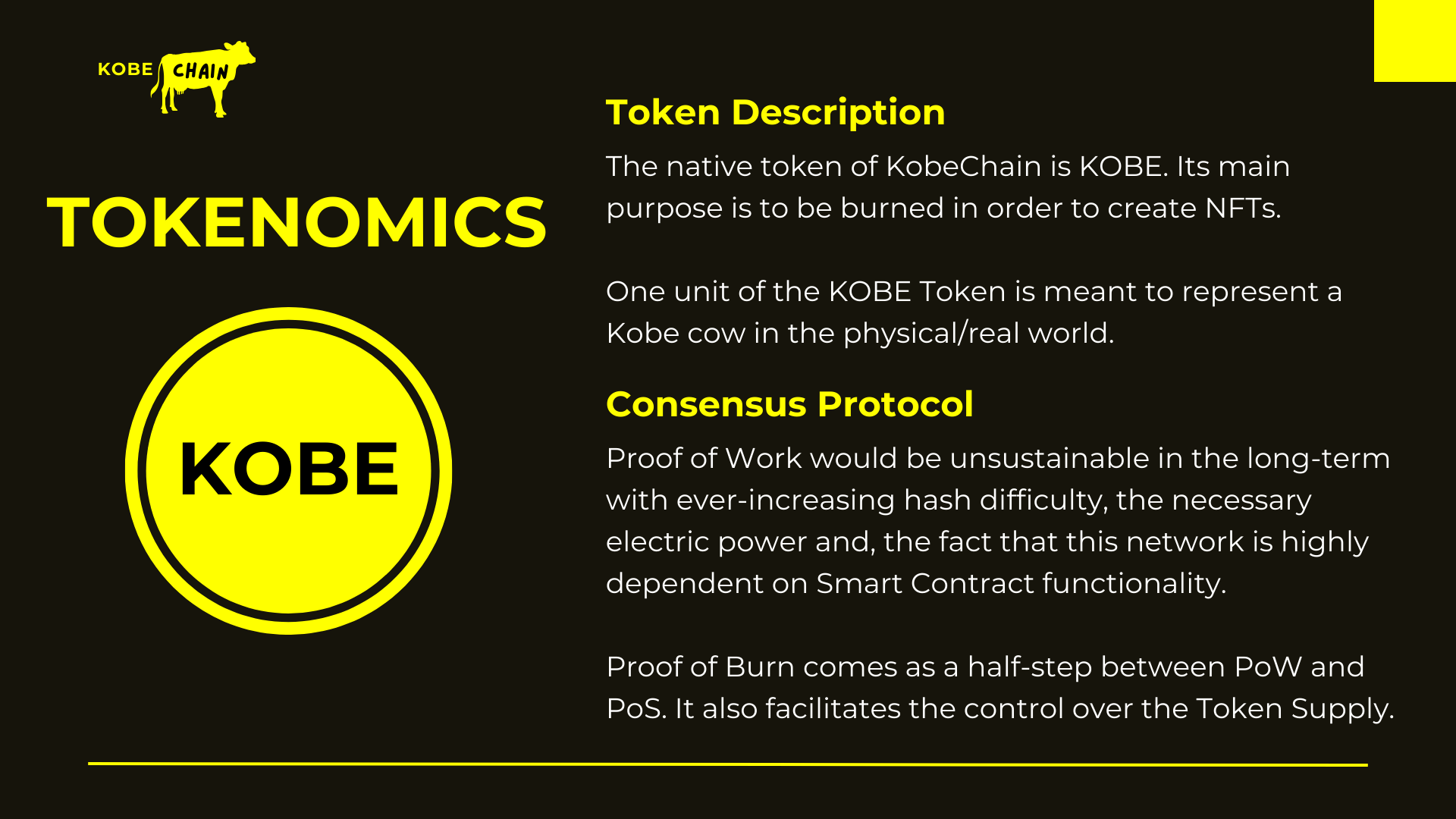
The native token for KobeChain is the KOBE. This token’s main function is to be burned in order to create the certificate NFTs. As a consequence of that, its usability by other than the producers will be limited. Nevertheless, as in all tokens, market sentiment will be a strong factor in determining its monetary value, especially for the end consumers, and can be leveraged in order to add value to the industry as a whole.
The consensus protocol used will be Proof of Burn. Proof of Work protocols might be more secure in terms of the computing power demands in order for any manipulation by a bad actor to occur, making those interferences impractical with current computers available to the average person, there is a catch. The amount of electricity consumed is much higher than that actually needed for the validation of the information of the blocks, a characteristic that collides with one of the pillars of this project, reducing the Carbon Footprint of this industry. This is something normal in the average decentralized chain due to the desire to not rely on trust. In the case of this project trust is an unavoidable factor in the equation because the NFTs that certify the meat might be immutable, but the people who issue them are people at the end of the day. The high consideration given to the Kobe Beef and the assurance that the product is genuine stands on a trust relationship between producer and consumer. The problem is that the end consumer rarely buys this kind of meat directly from the producer but, as in most supply chains in this age, from a retailer that might be the last in a chain of tens of intermediaries. So the immutability disregards the need to trust the intermediaries because it is impossible for them to manipulate the certificate without an impractical and really heavy investment in the KOBE token whose supply is mainly detained by the producers who would have no interest in facilitating that kind of manipulation. Proof of Work also isn’t efficient when it comes to a network that mainly revolves around smart contracts such as NFTs.
The logical next step would be Proof of Stake but, then there are problems in terms of the control over the network falling under the party which amassed the biggest slice of the circulating supply. What is proposed is to give a half-step and do a consensus protocol of Proof of Burn. In this protocol a miner would need to burn part of the supply in order to gain access to validating the blocks and consequently making the entire network be functional. For KobeChain if a miner wanted to partake in the validation of a block, he would need to burn x amount of KOBE.
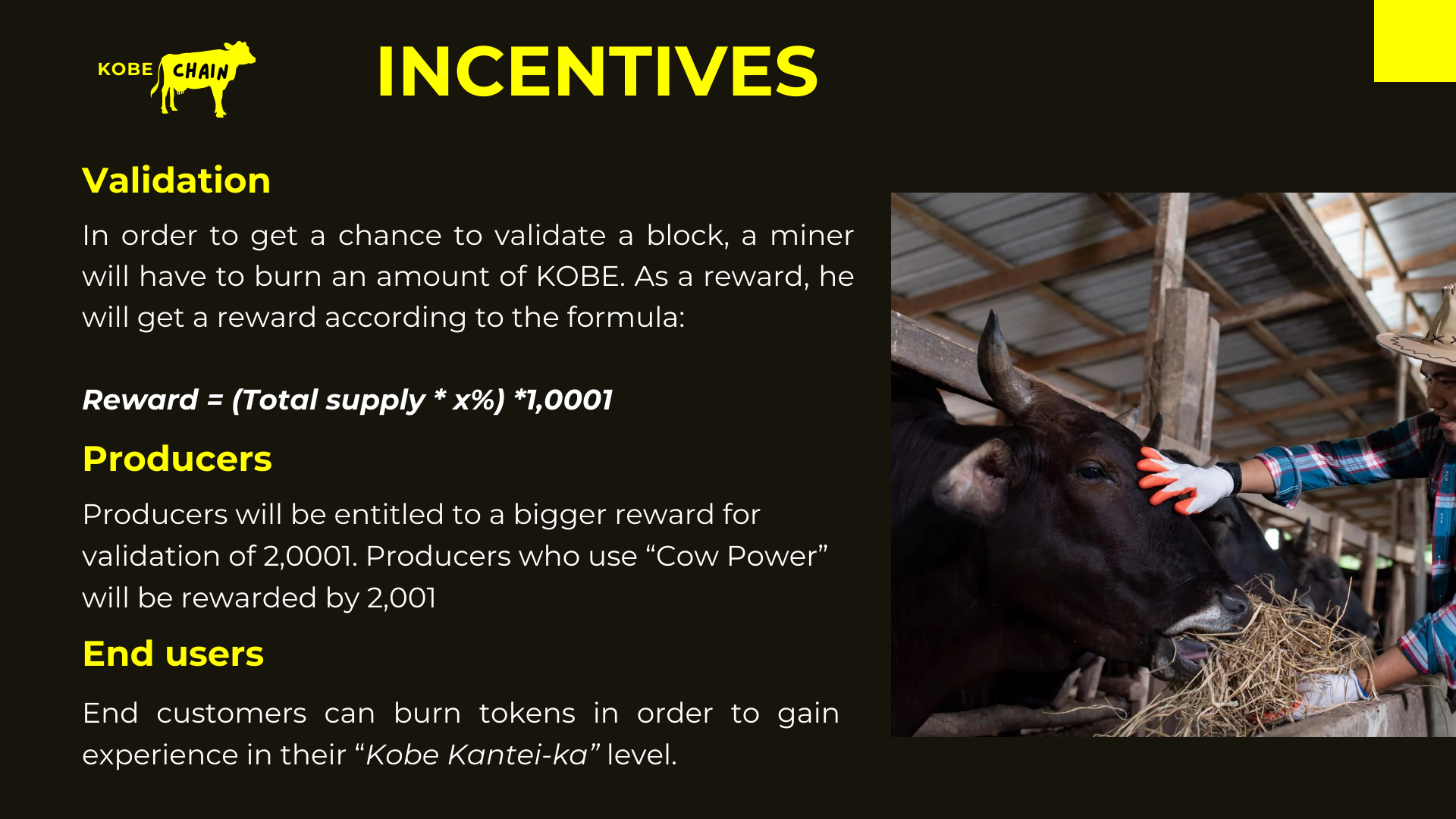
So what incentives are there for miners to burn their tokens? As a reward for validating the block they’ll be entitled to a reward proportional to the percentage that the tokens they burn has on the total supply of the coin and will be rewarded (Total supply * x%) *1,0001, where “x%” is the percentage of the total supply of the tokens burned. So if there were 100 KOBE in circulation and a miner burned 10 KOBE to validate a block he would be getting back 10.0001 KOBE. This example is merely illustrative, there is another mechanism to ensure that validation is not centralized in one party, which is that one party can’t validate more than one block in a row and the amount needed to burn will be set at a fixed value. This means that miners can collaborate in solving blocks and that collaboration is encouraged especially, in the form of mining pools.
Another reward is that if a producer is actually using their cattle’s manure to produce electricity as stated in previous chapters, they’ll be entitled to a bigger reward ratio for validating a block of 2,001 instead of 1,0001. Producers who did not use this environmentally friendly practices would only get 2,0001. So, producers who actually adopt these environmental responsible practices will be the ones with the most power over the network. The users who get the best conditions for rewards are the one who in the future will be able to validate more blocks.
Lastly, an aspect that is crucial is the control over who validates the network. Everyone can burn KOBE and validate the blocks of the network, as long as they are mining in a pool with one of the KOBE producers. This is where our collaboration with KBM&DPA comes into play. They are the ones who provide the information of who are the producers and what are their wallets. That information will then be updated in the KobeChain as needed, in order to grant the right people the correct privileges. The need for a certified producer to be present is that he would have no interest in allowing the validation of fraudulent blocks and would discourage bad actors from even trying since they would only be able to mine in pools with the entities most interested in upkeeping the integrity of the KobeChain.
6.2 NFT
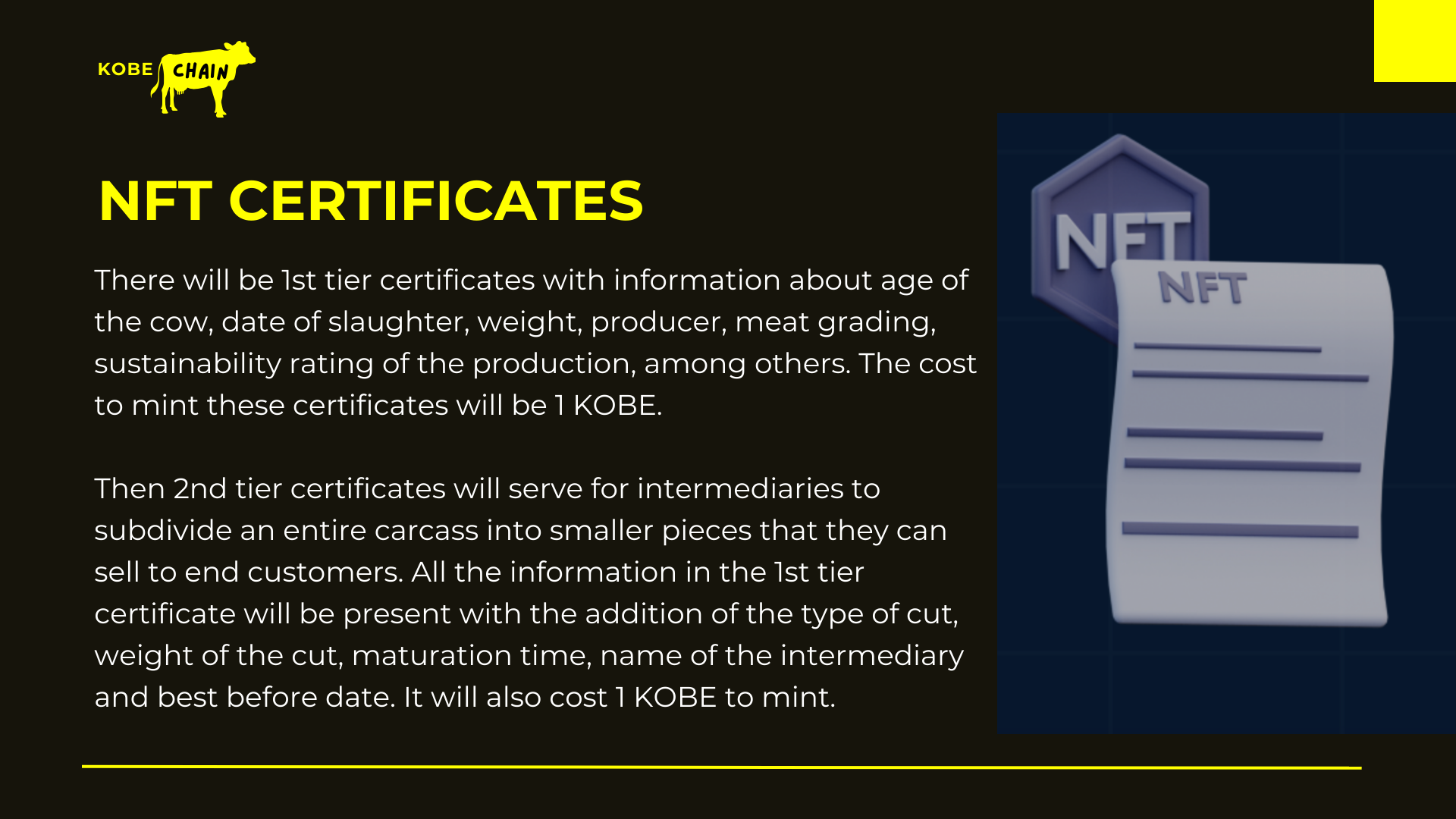
The NFT is what gives both producers and consumers the assurance that their product is in fact genuine. To illustrate the process, if a producer slaughters a cow, they’ll want to emit an NFT that certifies that entire cow as genuine. In order to create that NFT he would need to burn 1 KOBE. This is the NFT for the entire carcass of the animal.
Following that an intermediary would buy the carcass and divide it into beefs and other cuts to be sold to end consumers, he would also create a 2nd tier of NFT for every part he wished to sell with information, not only present in the 1st tier such as Age, date of slaughter, weight, producer, meat grading, among others… But also would add information related to the type of cut in that package, weight of the cut and “best before” date. The creation of this 2nd tier certificate would only be allowed for wallets that own the corresponding 1st tier certificate.
The amount of KOBE to burn would be proportional to the weight of the entire carcass. So if selling a 500 g beef of a 500 Kg cow it would cost 1/1000 of the amount burned to create the 1st tier NFT which in this case would be 0.001 KOBE. This is where the reward ratio for producers being double that of regular users comes into play. When they sold the carcass they would not only send the 1st tier NFT to the intermediary, they would also send that extra KOBE to allow intermediaries to create their own certificates for the entire cow’s carcass. Intermediaries would then print a label with a QR code and a “scratch area” with a one time use code under. When the final customer bought the piece of meat, the QR can be scanned which will open a website where he could insert his one time code and be sent his 2nd tier NFT from the intermediary’s wallet to his own.
End customers also can make use of an incentive where they can burn KOBE in order to gain a score to determine their level of expertise in Kobe beef. In order to have the KOBE tokens, they would need to buy them from miners through third party exchanges creating an opportunity for another third party and creating a new economic value proposition for miners to want to mine and burn their supply in order to be able to receive the validation rewards.

This could also cut on producers' losses because, if one of his cows died before time or due to disease is not fit for consumption, they can always sell the KOBE token they have for that cow and recoup some of the FIAT currency investment they made in the cow.
6.2 Distribution Plan
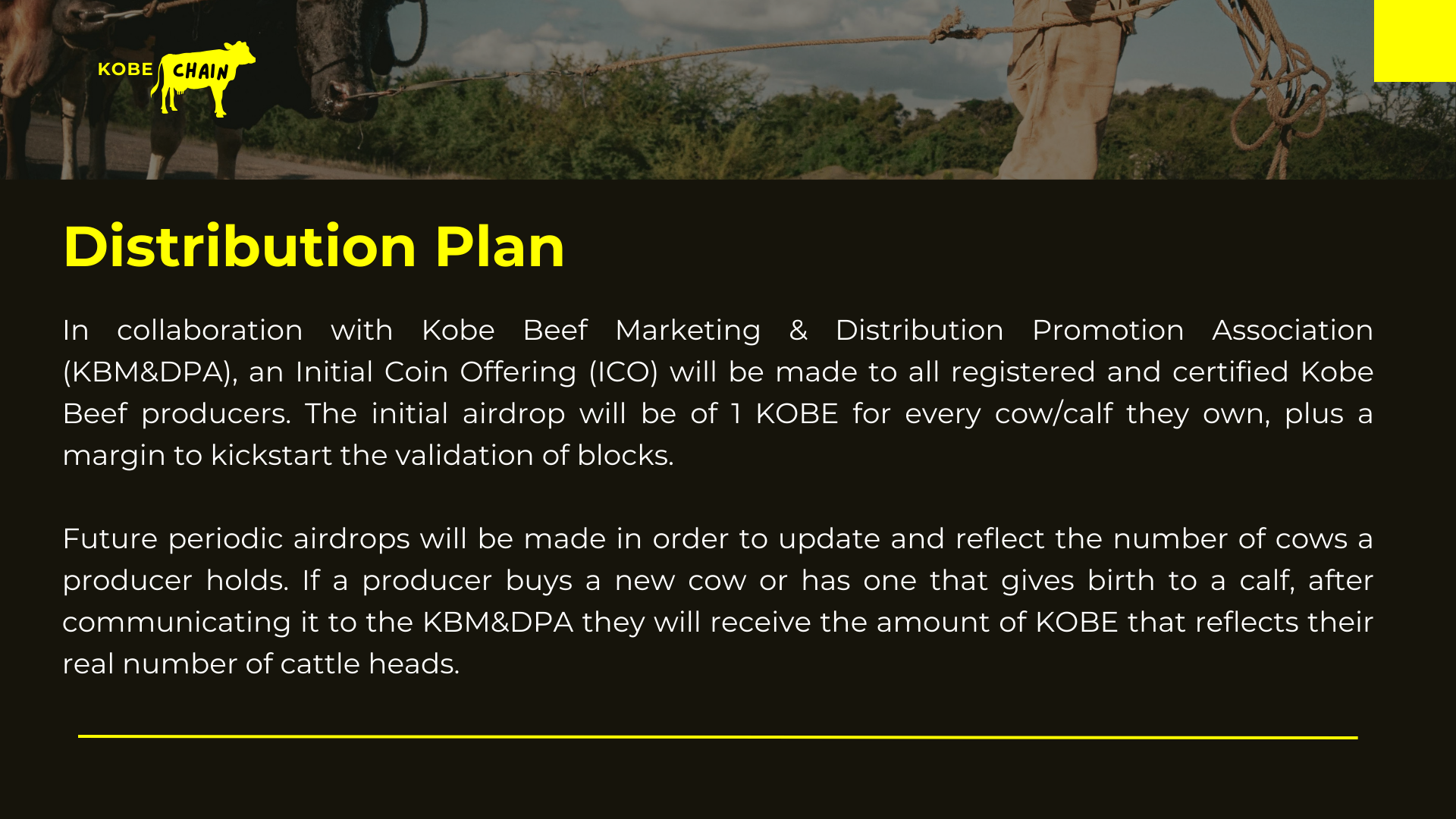
As far as distribution there will need to be an Initial Coin Offering in the form of an airdrop to Kobe producers. That airdrop will be done in collaboration with KBM&DPA who will give a list of all the producers and of how many cows each of them have. Then the producers will receive an Airdrop of the same number of KOBE as the cows they have with an additional margin to cover the initial validation of the blocks. Additional Airdrops might happen when a producer buys new cows to replace the slaughtered one or has a new one through reproduction. It is important to remember that the KOBE token is meant as a digital representation of the value of a Kobe cow for the chain. So, as long as that cow exists in the real world the owner of the animal should have a KOBE token to represent it in the chain. If by the nature of the PoB protocol, mismanagement or user error the established mechanisms fail to reflect that, the intervention through the form of airdrops might be used. Of course there will be a surplus of KOBE in relation to the amount of cows that actually exist but, that is meant as an incentive for third parties to also participate in the validation protocol and have benefit in terms of alternative economic uses for this coin.
There is no set supply cap, as the supply is dependent on the number of cows that exist in the real world and the *0,0001 or *0,002 rewards attributed to miners. The burning mechanisms suggested should be enough to avoid scenarios of devaluing the currency in the exchanges due to excessive supply.
7. Regulatory and Compliance
7.1 Legal Considerations
Complementing a blockchain-based solution in the Kobe beef industry involves navigating a complex legal landscape that encompasses food safety, agricultural standards, and blockchain technology regulations.
Food Safety Regulations: Ensuring that Kobe beef products meet stringent health and safety standards is paramount. The blockchain solution will comply with local and international food safety laws, such as the Food Safety Modernization Act (FSMA) in the United States and the European Union’s General Food Law Regulation. This involves accurate and transparent recording of each step in the beef production process, from rearing to distribution, ensuring that all health and safety standards are met and verifiable on the blockchain.
Agricultural Standards: Adhering to agricultural regulations is essential for sustainable farming practices and animal welfare. These standards include regulations on livestock management, environmental impact, and ethical farming practices. The blockchain will record compliance with these standards, providing a transparent and immutable record that can be audited by regulatory bodies. This ensures that all participants in the supply chain adhere to best practices, promoting sustainability and ethical treatment of animals.
Blockchain Regulations: The legal framework for blockchain technology varies by jurisdiction but generally includes regulations related to data privacy, digital assets, and smart contracts. Compliance with data protection laws, such as the General Data Protection Regulation (GDPR) in the EU and the California Consumer Privacy Act (CCPA) in the US, is crucial. The blockchain solution will incorporate privacy-preserving techniques and ensure that personal data is handled in accordance with these regulations. Additionally, the use of smart contracts for automating transactions and certifications must comply with existing legal standards to ensure enforceability and legal recognition.
Intellectual Property and Trademark Protection: Protecting the intellectual property (IP) associated with Kobe beef branding and certification is vital. The blockchain solution will include mechanisms to secure and manage IP rights, ensuring that trademarks and certifications are protected against misuse and counterfeiting. Not only that, mas it's also important, as mentioned above, to establish a partnership with Kobe Beef Marketing & Distribution Promotion Association, to receive the certificate that a certain beef can be considered a Kobe Beef, after meeting the strict requirements.
Cross-Border Trade Regulations: For international trade, the blockchain solution must comply with various import and export regulations. This includes adhering to tariffs, trade agreements, and documentation requirements. The blockchain’s immutable records can streamline compliance by providing transparent and easily verifiable documentation for customs and regulatory authorities.
7.2 Risk Management
Implementing a blockchain solution involves several potential risks that must be proactively managed to ensure the project’s success.
Cybersecurity: The risk of cyber attacks is a significant concern. To mitigate this, the blockchain solution will employ advanced encryption methods, multi-signature authentication, and regular security audits. These measures will protect the integrity of the data and prevent unauthorized access.
Regulatory Non-Compliance: Non-compliance with legal standards can result in penalties and damage to reputation. Continuous monitoring and auditing of compliance with food safety, agricultural, and blockchain regulations are essential. The blockchain’s transparent and immutable records facilitate easier audits and regulatory inspections, ensuring ongoing compliance.
Resistance from Stakeholders: Resistance from farmers, distributors, and consumers to adopt the new technology can hinder implementation. Engaging stakeholders early through consultations, training sessions, and pilot programs can address concerns and demonstrate the benefits of the blockchain solution. Clear communication about the advantages, such as increased transparency, reduced fraud, and enhanced marketability, can help gain stakeholder buy-in.
Technological Risks: Potential technical challenges include scalability issues, interoperability with existing systems, and ensuring the reliability of the blockchain network. A robust technical architecture, regular updates, and continuous testing can mitigate these risks. Collaborating with technology partners who have expertise in blockchain solutions can also enhance the project’s resilience.
Market and Economic Risks: Fluctuations in the market demand for premium beef and changes in economic conditions can impact the project's success. Diversifying the application of the blockchain solution to other industries and products can reduce dependency on a single market and spread the economic risk.
Legal Disputes and Liability: Disputes related to the implementation and use of blockchain technology, such as smart contract execution and data accuracy, can arise. Establishing clear legal frameworks and terms of service, along with liability insurance, can mitigate these risks.
By addressing these risks through comprehensive risk management strategies, the project can ensure the successful implementation and operation of the blockchain solution, fostering trust and promoting sustainability in the Kobe beef industry.
8. Conclusion
To conclude, this white paper outlines a comprehensive blockchain-based solution to address the significant challenges facing the Kobe beef industry, including issues of transparency, authenticity, and sustainability.
The proposed solution leverages the strengths of blockchain technology, such as immutability, security, and traceability, to enhance consumer trust and streamline operations for farmers. By adopting this innovative approach, the industry can meet the growing demand for ethical and high-quality beef products, opening new market opportunities and setting new standards for transparency and sustainability.
A key aspect of this solution is the tokenomics and incentive mechanisms designed to drive engagement and ensure the sustainability of the system. The native token, KOBE, plays a central role in the ecosystem. Producers and miners are incentivized to participate in the network through a Proof of Burn (PoB) consensus mechanism, which aligns with the project's environmental goals by encouraging the use of methane-produced energy. By burning KOBE tokens, validators can participate in block validation, earning rewards proportional to their contribution, thus promoting decentralized and eco-friendly network operations.
For consumers, the use of NFTs tied to each beef product ensures authenticity and provides detailed information about the product's origin and quality. This transparency not only enhances consumer trust but also justifies the premium pricing of Kobe beef. Additionally, consumers can engage further by acquiring KOBE tokens to enhance their expertise and engagement within the ecosystem, creating a loyal and informed customer base.
Overall, the integration of blockchain technology, combined with thoughtful tokenomics and incentive mechanisms, positions the Kobe beef industry for significant advancements in transparency, sustainability, and market growth. Stakeholders are encouraged to participate in this innovative ecosystem to drive forward a more sustainable and trustworthy premium beef market.




评论 (0)